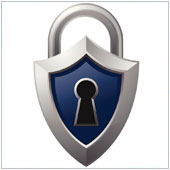| 5 ways to secure personal info |
As October is Cyber Security month in the US, it’s the perfect time to take a look into ways you can make your business and systems more secure. One of the best places to start is to look at how your company stores and protects personal information. Here are five tips that can help you protect personal information in your company. 1. Change your passwords It is a good idea to change your passwords on a regular basis. You should change them at least once a year, but far preferable is to change these every 90 days. This will minimize the chances of your password being hacked and likely increase overall security. 2. One password shouldn’t rule them all The best solution is to have a unique password for each system and one that is as different as possible. Using a password manager like Dashline or LastPass might be worth looking into but just be sure to use a separate password to access to this system as well! 3. Don’t keep everything In order to maximize security, you should look at every link and ensure it is legitimate before you click on it. The best way to do this is to look at the sender’s email address and ensure there are no spelling mistakes or weird characters. Look for any strange spelling, and if possible check there is https:// at the beginning of all links. This indicates that the page is legitimate. If a link seems even remotely suspicious, simply delete it. 4. Don’t react immediately 5. Develop policies Once you have developed a policy, communicating it to your employees and ensuring that they are all on the same page in following it is essential. We know it can be challenging to develop an effective policy, so why not contact us? We may be able to help not only secure your private information but also develop a sound policy that is workable. Published with permission from TechAdvisory.org. Source.
|
| 5 tips for disaster communication |
|
| Define: Packet delays |
|
| Storage limits for Google Drive |
|
| 5 tips to get more out of social media |
|


 If you are a small business owner or manager you are likely the person that everyone turns to when things are going well, and not so well. One problem you may face is a security breach, where private information is stolen or leaked. If this were to happen, you will likely be asked questions and maybe even held accountable. Therefore, it is advisable to take steps to ensure that the personal information in your systems is secure.
If you are a small business owner or manager you are likely the person that everyone turns to when things are going well, and not so well. One problem you may face is a security breach, where private information is stolen or leaked. If this were to happen, you will likely be asked questions and maybe even held accountable. Therefore, it is advisable to take steps to ensure that the personal information in your systems is secure. As we all know, disasters can strike at any time. Business owners and managers often go to great lengths to ensure that their business is protected or prepared for any disaster by implementing contingency plans. During a disaster however, the biggest issue businesses face is communication. If this breaks down, even the best laid plans will go to waste.
As we all know, disasters can strike at any time. Business owners and managers often go to great lengths to ensure that their business is protected or prepared for any disaster by implementing contingency plans. During a disaster however, the biggest issue businesses face is communication. If this breaks down, even the best laid plans will go to waste. While VoIP (Voice over Internet Protocol) systems have become the go-to solution for business telecommunications, it’s not perfect. Sure, on the most part, the systems offer better call quality than traditional phone lines but there will be times when there are delays and poorer call quality. This is usually caused by what experts call ‘packet delays’, have you heard this term before?
While VoIP (Voice over Internet Protocol) systems have become the go-to solution for business telecommunications, it’s not perfect. Sure, on the most part, the systems offer better call quality than traditional phone lines but there will be times when there are delays and poorer call quality. This is usually caused by what experts call ‘packet delays’, have you heard this term before? Cloud-based platforms like Google’s various apps are quickly becoming the must-have platforms for businesses. Take for example Google Drive which combines cloud storage and a productivity suite offering a comprehensive business solution. While there is little doubt as to the usefulness of Drive, some users often ask as to whether there is a limit to the size of files that can be stored and created.
Cloud-based platforms like Google’s various apps are quickly becoming the must-have platforms for businesses. Take for example Google Drive which combines cloud storage and a productivity suite offering a comprehensive business solution. While there is little doubt as to the usefulness of Drive, some users often ask as to whether there is a limit to the size of files that can be stored and created. In order for a business to be successful, you must have a solid marketing strategy. These days that means having an Internet presence. While having a website is a good start, most marketing relies to some extent on social media. With a solid social media presence you can stimulate not only increased brand awareness but also achieve higher search ranking.
In order for a business to be successful, you must have a solid marketing strategy. These days that means having an Internet presence. While having a website is a good start, most marketing relies to some extent on social media. With a solid social media presence you can stimulate not only increased brand awareness but also achieve higher search ranking.